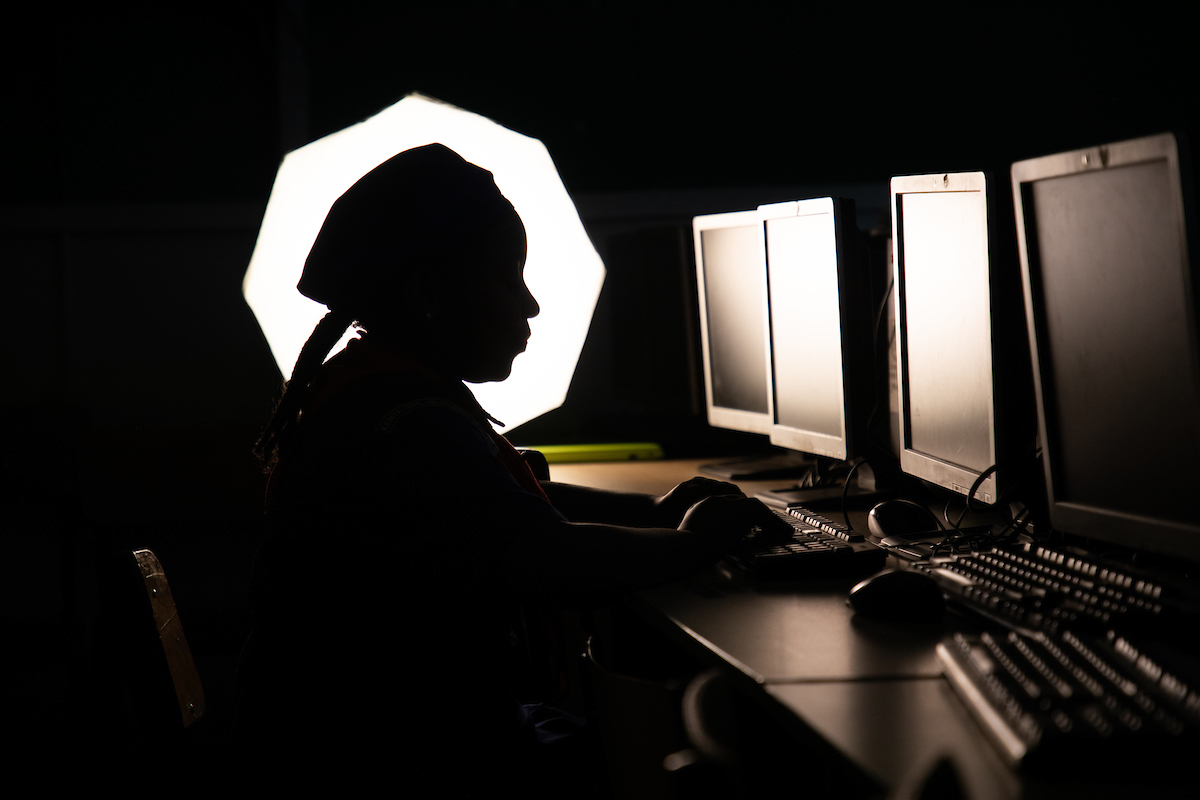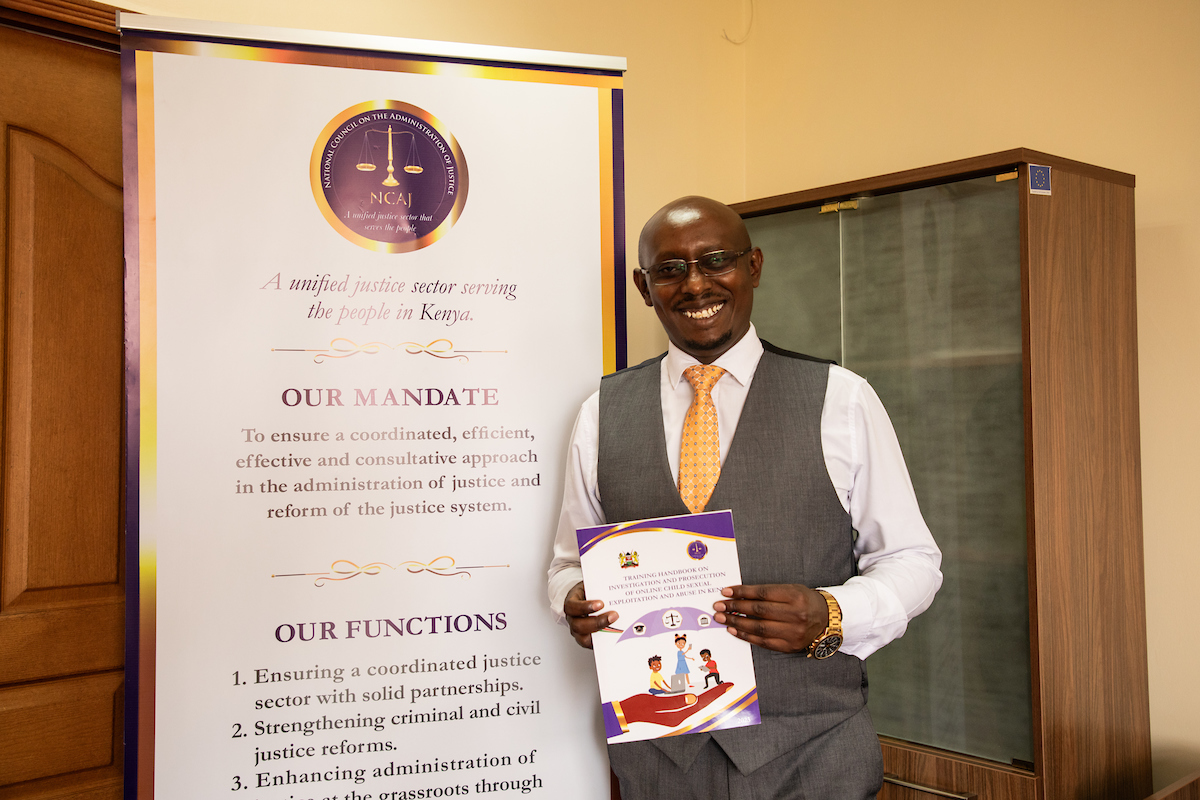“I got really scared because a lady I talked to on social media started saying mean things. She told me she’d make up fake pictures and show them to my family and friends if I didn’t keep talking to her and do what she wanted. I started chatting with her online because she was older and seemed nice at first. I kept blocking her, she kept on finding me. She knew who my friends and family were through seeing them online on my profile. She was threatening me.” Sherlene (name changed), a 13-year-old student in Nairobi.
How can Sherlene, and countless others, navigate the internet safely in a world where it stands as the source of communication, social interaction, and information—a digital playground where today’s children are not just visitors, but residents?

Although children most often face online abuse or exploitation from people they are familiar with, the digital world also opens up opportunities for them to encounter strangers, heightening their risk of harm. In Nairobi, where the urban hustle often drowns out the whispers of the vulnerable, an important development in improving online safety for children has begun to emerge. Through funds from Safe Online, UNICEF Kenya is supporting the Government to fortify its defences against the virtual threats that lurk.
The Anti-Human Trafficking and Child Protection Unit (AHTCPU), initially anchored in Nairobi, stands as the frontline fortress against online child sexual exploitation and abuse (CSEA). This vital unit is working in partnership with global allies to prevent and address cases of online child abuses. It is set to extend its reach to Mombasa, spreading a protective umbrella over more regions. The project, backed by UNICEF, not only empowers AHTCPU’s team but also fortifies the pillars of justice, education, and social services.

“It is very heavy work here. Every day we receive many reports of child sexual exploitation materials, conversations, threats that people face and do not know how to stop or handle. One of the recent cases was involving a care-taker and a five-year-old child. The child was used as a sexual actor by the caretaker to be sent to the groomer in return for money. We work hard to identify the people behind and act according to the rules towards handling online child sexual exploitation cases in Kenya,” shares Vanessa (name changed), a detective from AHTCPU unit in Nairobi.
At the heart of this transformative initiative stands a handbook, a manual meticulously crafted to guide judges, prosecutors, law enforcement officials, and social workers in investigating and prosecuting online CSEA cases. The launch of the “Training Handbook on the Investigation and Prosecution of Online Child Sexual Exploitation and Abuse online (CSEA)” by the Hon. Lady Justice Martha K. Koome, Chief Justice and President of the Supreme Court of Kenya, marked a pivotal moment in the fight for the safety of Kenyan children online.
“The Training Handbook has been a real game-changer for us. It is helping us to train our police to deal with online child abuse cases. Before, we didn’t really have clear rules for handling these kinds of situations. If someone came to the police feeling scared about online abuse, we didn’t quite know what to do. But now, thanks to the handbook, things are different. It’s improved our laws and standards, and our country now recognizes online child sexual exploitation as a serious crime. With the handbook, we can properly educate and train our police to know how to deal with threats and abuse online,” shares Mr. Tom Nyabuti, Police Officer Trainer at AHTCPU.
“The Training Handbook is crucial as it fills a training gap in handling and addressing online CSEA. It provides a structured, multi-stakeholder approach and covers guidelines for evidence handling, investigation, and prosecution of online CSEA. With the introduction of the Handbook, we aim to change the current landscape of online child abuse in Kenya by providing comprehensive guidance – from the police, to the court- on investigating and prosecuting online CSEA cases,” shares Dr. Moses W. Marang’a – Executive Director, National Council on the Administration of Justice (NCAJ).
Established in 2011, the National Council on the Administration of Justice (NCAJ) is a constitutional institution uniting policymakers in Kenya’s justice sector. UNICEF plays a significant role in supporting NCAJ, particularly in institutionalising the Handbook and its rollout.
“Safe Online contributes highly to this process by supporting various interventions related to online CSEA. This includes financial support for the development and implementation of the Handbook, and initiatives that address broader issues of child safety online. Safe Online also plays an important role in gathering and analysing data related to online CSEA, which informs the strategies and actions outlined in the Handbook,” says Roselyne Kabata –Child Protection Officer, UNICEF Kenya.
As the pages of the handbook turn, so do the wheels of progress. The project unfolds across various fronts including Government departments and the private sector, embodying the ethos of collaboration and innovation.

The adoption of a curriculum dedicated to investigating and prosecuting online CSEA cases promised to revolutionise the justice sector’s response. Amendments to the Sexual Offences Act are underway, reflecting the evolving landscape of online threats.
“The Training handbook is a huge success for our laws,” Dr. Marang’a says. He continues: “UNICEF has supported the development of the Handbook, facilitated its institutionalisation, and continues to work on refining its processes. Additionally, UNICEF provides training for frontline officers and digital tools for evidence and record management.”
UNICEF Kenya recognises further that protecting children online is a collective responsibility that transcends individual roles. Engaging with the youth through the Yunitoker platform, a no-cost messaging platform accessible through SMS and WhatsApp, allowing young individuals to share their viewpoints and obtain information on topics that matter to them, exemplifies the project’s dedication to incorporating the perspectives of those most affected.
The Yunitoker Youth Engagement on Safe Online’s flagship Disrupting Harm Study reveals the power of engaging the youth directly. Today, thanks to the funds received from Safe Online, UNICEF Kenya is providing a space for young voices to shape interventions and programs, ensuring that the strategies devised resonate with the very demographic they aim to protect. Online Safety Youth Engagement Forum, held in September 2023 in Nairobi, brought together more than 200 young participants to review insights on online child sexual exploitation and abuse and how to promote online safety for the youth in Kenya. This initiative continues encouraging a dynamic environment where the insights and voices of young people are not just heard but are instrumental in crafting meaningful and resonant strategies for safer online spaces.
Today, I stand as an advocate for women’s rights, drawing from my experiences to inspire and lead change. I am grateful for this journey because it has equipped me to show hope and resilience. It allows me to stand before the youth and authorities not just as a survivor, but as a warrior, actively seeking and discussing solutions for a safer future for all,” says Queentah Wambulwa, an award-winning psychologist and social entrepreneur, during the Online Safety Youth Engagement Forum.
“I’ve transformed a deeply personal and painful experience into my source of strength. When my privacy was violated online, with my intimate images exposed by an ex-boyfriend, it wasn’t just a personal setback; it became a pivotal moment in my life. This nightmare, seen by my family, friends, and more, happened when I was just 17-years-old. Yet, it has fueled my journey of learning, growth, and empowerment.
–Queentah Wambulwa
And so, in Nairobi’s busy life, a powerful movement is underway to protect children like Sherlene from the dangers of online exploitation. This story, once marked by fear, is now being re-written, thanks to the leadership of the Kenyan government with support from UNICEF Kenya and Safe Online. As Kenya continues to write this new chapter, the commitment to safeguarding the online world shines brightly, ensuring that the dreams of its youngest citizens are protected.
Watch Below: Our Work and Impact in Kenya.
Discover how Safe Online’s fund is making a difference in Kenya. Our work focuses on creating a safer digital environment for children, empowering communities with knowledge, and providing resources to combat online abuse and exploitation.
Witness the positive changes and hear firsthand stories from those whose lives have been touched by our efforts.
PREVIOUS
Stories of Impact
Images: © Safe Online/Vincent Tremeau

Copyright Safe Online 2023 ©
All imagery is taken from the Safe Online and UNICEF image library
We are here to ensure every child and young person grows in to the digital world feeling safe, and is protected from harm.
We support, champion, and invest in innovative partners from the public, private, and third sectors working towards the same objective.
We believe in equipping guardians and young people with the skills to understand and see danger themselves once accessing digital experiences without supervision.